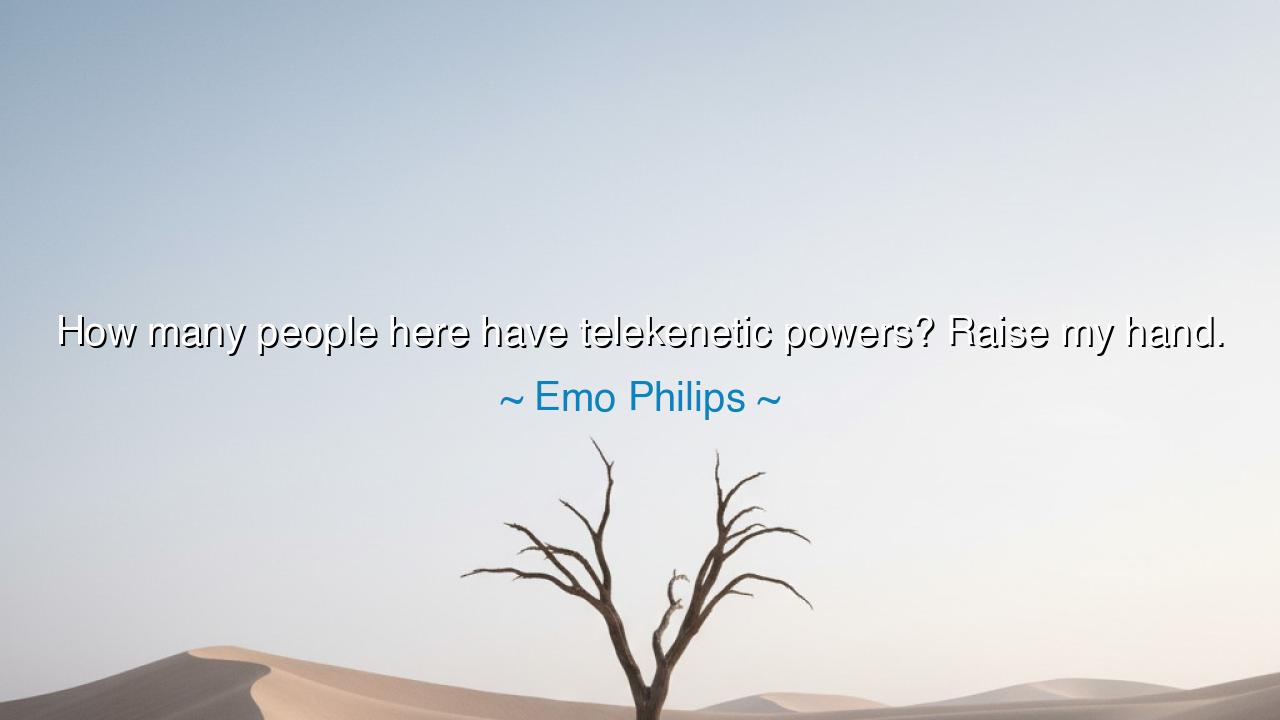
How many people here have telekenetic powers? Raise my hand.






In the vast theater of human existence, there are moments when words, seemingly simple and playful, reveal deeper truths about the human spirit. The words of Emo Philips, "How many people here have telekinetic powers? Raise my hand," offer a blend of humor and wisdom that speak to the nature of perception, self-awareness, and the paradox of human desire. At first glance, the statement is a joke, a playful twist on the common expectation that one might have special powers. Yet beneath the surface lies a profound commentary on the human condition—how we often search for powers outside ourselves while missing the simple, innate abilities we already possess.
In the ancient world, the Greeks believed that humans were both bound by their limitations and yet, capable of great feats. Plato, in his dialogue The Republic, spoke of the philosopher’s journey as one of liberation, moving from the shadows of ignorance into the light of truth. But even as the philosopher sought to understand the world and its mysteries, Plato understood that it was not external powers that truly defined a person’s greatness, but the mind’s ability to shape its own reality. In this context, Philips’ playful remark becomes a reflection on how often we look for extraordinary powers—whether it be telekinesis or supernatural abilities—without realizing that the true power lies within our own capacity to control and shape our actions.
Consider the story of Heracles, the great hero of Greek mythology, whose immense strength was both his gift and his burden. Heracles was born with incredible physical abilities, yet his true struggle lay in the inner battles he faced. His labors were not just tests of strength, but of self-discipline, humility, and wisdom. Heracles’s tale teaches us that power is not merely about external forces, but about the ability to control one's own actions and decisions. Like Philips’ humorous statement, we may look for extraordinary powers, but the true power lies in the control we have over ourselves and how we choose to shape our destiny.
In Rome, Seneca the Younger, the Stoic philosopher, spoke of the importance of controlling one’s own mind and emotions. He wrote, "We suffer more often in imagination than in reality." Seneca understood that the mind had a tremendous power to shape our experiences, and that the real challenge lay in mastering that power. Philips’ words echo this sentiment, reminding us that the real power does not lie in external forces, but in our ability to govern ourselves, to rise above the distractions of the world, and to direct our will toward constructive and meaningful actions.
This theme of inner power and self-mastery can also be found in the life of Gandhi, whose nonviolent resistance became a symbol of the power of the mind and will. Gandhi did not possess supernatural abilities, but his belief in the power of truth and self-control led to the independence of a nation. His life teaches us that true strength comes not from the ability to manipulate external forces, but from the power to influence the world around us through peace, purpose, and determination. Like Philips’ humorous reflection, Gandhi’s life underscores the importance of self-awareness—recognizing that the most powerful force we possess is the ability to change ourselves.
The lesson Philips offers is a profound one: real power lies not in the supernatural or the extraordinary, but in the ability to recognize and harness our own potential. In modern times, we may be drawn to the idea of external powers, whether it be technology, superhuman strength, or the abilities portrayed in media. Yet, Philips’ humor invites us to turn inward, to reflect on the remarkable potential that resides within us. Like the ancients, we must come to understand that the true powers are not outside of us but are rooted in our minds, our actions, and our intentions.
In our own lives, we must recognize that the supernatural abilities we often long for are already present within us, not in the form of magic or force, but in our capacity to change, to grow, and to shape our world. Let us not be distracted by the allure of external powers, but instead, look within to find the strength to act with purpose, to control our emotions, and to create the change we seek. For, as Philips subtly reminds us, we already have the most powerful tool at our disposal: our own mind.






AAdministratorAdministrator
Welcome, honored guests. Please leave a comment, we will respond soon